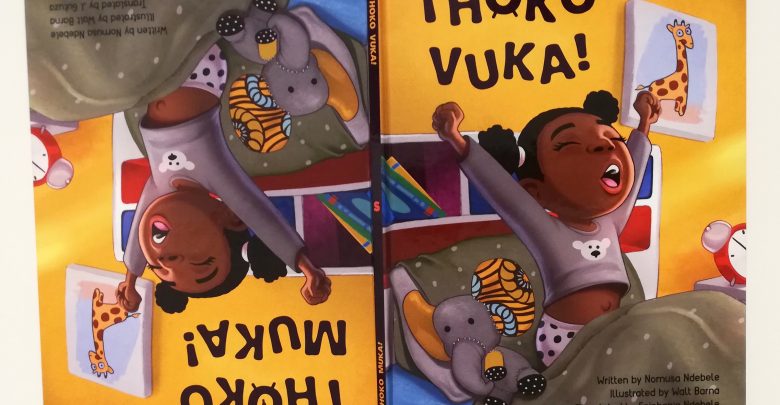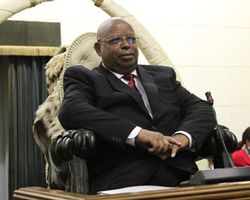Saanrize helps Zimbabweans in the diaspora learn native languages

By Nomaqhawe Ndlovu
Nomusa Ndebele and Carol Dzingai created Saanrize to help the next generation of African children take pride in, connect with, and know their rich heritage.
The Saan are the oldest tribe in Africa, thus the oldest of us all. To honour that connection they chose the first part of the name “saan”.
They see their mission as being new dawn and creating of a “saan” uprising that strengthens our children’s identities and allows us to own our narrative and shape our destiny as “saan” people.
Nomaqhawe Ndlovu recently got in touch with Nomusa and Carol to find out more about their initiative.
What motivated you to open Saanrize?
Our children deserve to have beautiful, world-class content that celebrates their languages, their heritage, their history, and their skin. Saanrize was created to fill that gap and to help the next generation of African children take pride in, connect with, and know their rich heritage.
Walk into any bookstore or turn on the TV in any country in the world and you will find a plethora of children’s books and shows in that country’s native languages. In Africa, you will find an abundance of books and shows in colonial languages and very little in vernacular.
In addition to that, most of this content features characters that do not reflect the population or the stories of the African continent. We find that absurd!
Chimamanda Ngozi Adichie reportedly said growing up as an African child reading British and American books she often had to develop a ‘parallel imaginary life’ to connect with them. Did you feel the same way growing up?
Absolutely! Our youth was filled with stories that did not reflect our realities at all. We had to develop these “parallel imaginary lives” to connect with them because we had nothing of our own to connect to. There were no characters that looked or spoke like us, no shows or cartoons that celebrated our existence. African children are still being forced to develop these “parallel imaginary lives”, and while exposure is not a bad thing, there first needs to be a foundation of self-acceptance and pride and thereafter a balance that honors the myriad of stories we have to tell.
How do you think black children particularly Zimbabwean children benefit from seeing themselves represented in literature?
There is power in seeing someone who looks like you doing fun, amazing and courageous things. It allows a child to dream limitlessly and shows them that not only do they matter but who they are and how they are is more than satisfactory.
We strongly believe that positive representation in media will help nurture pride and self-confidence, in African children. And perhaps most importantly, it will show them that they belong in this world.
Perhaps if there were more curly-haired, dark-skinned boys and girls of all shapes, sizes and abilities in books and on TV, we wouldn’t hear stories of children coming home and telling their parents that their “nappy” hair is ugly, or that they want long flowing hair, or lighter skin.
Lack of representation to some extent also reinforces the false idea of Eurocentric superiority, (however unintended) and a singular Eurocentric narrative that leaves black children “voiceless” and “non-existent” After all, if all the heroes and heroines, princesses and warriors in stories don’t look like them and are never based in a world that they can identify with, and if what they show as beautiful is the “long flowing blonde hair and fair skin”, how then does a black child “see” themselves? And how do other kids “see” them?
In recent history Zimbabwe has enjoyed a rather ambiguous reputation. What are you telling your children, nieces and nephews in the diaspora about their home country?
It is important to us that they identify with their “home, home” because though they live in the diaspora, their roots are Zimbabwean. While it is true that Zimbabwe is in a difficult period, we choose to reinforce the positives: their family members that still live there; our traditional values that encourage them to respect each other and their communities; our culture that is full of beauty, of music and of joy.
We tell them that Zimbabwe has amazing people, fantastic weather, delicious food, and breath-taking scenery and that though things are bad right now, it won’t last forever. It is important that they know that being Zimbabwean is special, and something to be proud of.
What suggestions do you have to increase reading culture locally in children especially with the ubiquity of technology to entertain them?
Creating a reading culture at home is critical to increasing reading culture in the country at large. It takes some discipline though, parents (both mom and dad) can start reading to them and telling them stories (especially in our local languages) as early as during pregnancy. They can then continue once the children are born. Story-telling is an inherent part of our culture so parents just need to take up that tradition again. As they get older, the children can independently and proactively choose to read on their own with physical books or on digital platforms.
Parents also have to decide that reading is more important than the TV, the smartphone or the computer. Prioritizing spending on books rather than video games, etc. would help. Furthermore, children copy what their parents do, and if all the parents are doing is spending hours staring at a screen then it’s no wonder children do the same!
The government could also do its part by prioritizing local languages in schools and reading programmes in schools. Additionally, they could rebuild the city libraries that provided so much joy and entertainment when we were kids. And lastly, they could support local writers and publishers who are working so hard to tell our stories.
What is your vision for Saanrize and how if any way at all can Zimbabweans help you realise it?
Our languages and heritage are on a dangerous trajectory towards extinction. Our vision is to change the prevailing societal narrative and reframe how an entire generation of children of African descent see themselves. Particularly with regards to their native languages and heritage and how others see them – with unsurmountable pride, belonging and respect. To fulfill that vision, we aim to grow into a company with a comprehensive range of inclusive children’s products and content that are representative of all the linguistic, and cultural diversity present not only in Zimbabwe but throughout Africa.
It’s an undertaking that we can’t, won’t, and don’t want to do alone. Therefore, we are looking to collaborate with talented African artists, writers, musicians, animators, and makers to help make that vision come true. So, any Zimbabweans from all over the world who are passionate about preserving their heritage and languages are welcome to join us in this “saan-rizing”. All they have to do is send us an introductory email at collaborators@saanrize.com and we’ll take it from there.
Ultimately what is your hope for Zimbabwe?
We hope that a time will come when we value and take as much pride in the preservation and mastery of our native languages as we do in English. As much as we have been independent since 1980, to some degree we have not decolonized our educational systems and our minds to value our rich culture and heritage. We continue to put English on a pedestal vis- a- Vis our own languages, and we still tend to favour Shona and Ndebele while the rest of our 12 official languages remain marginalized. Our languages matter because they are critical elements not only of our identity but also of our culture.
Too often a single or Eurocentric narrative is what is being taught at the expense of a rich appreciation of the roles that Zimbabwe and Africa have played and continue to play in World History. To this end, we hope our authentic African history will be broadly taught and emphasized in schools/curriculum in Zimbabwe, across the continent, and even globally.
We also hope that we will lean more into who we are as Zimbabweans and Africans so that we believe in ourselves again. That belief has been beaten out of us through years of hardship, but imagine if we took it back. Imagine if everyone, not only our leaders realized that we are all connected, that all our stories matter, that representation matters. Imagine if we looked inwards and came together to solve our problems. How high could we soar? Perhaps if we adopted Ubuntu and the wisdom of how our ancestors lived together and with nature, we could really fuel a new Zimbabwean and African rising and chart our own authentic course.
The saanrize app, featuring digital versions of Thoko Vuka! Thoko Muka! and fun flashcards, is now available for IOS and Android. To download the app, please follow the links below, or search for saanrize on the App Store or on Google Play.
android app: https://play.google.com/store/apps/details?id=com.app.saanrize
ios app: https://itunes.apple.com/us/app/saanrize-african-kids-content/id1466515161?mt=8







What a great article. I am glad to see someone is addressing the needs for kids in the diaspora. A great initiative and I look forward to see more from this start-up.
What Saanrize is doing is brilliant! I’m not in the diaspora but I wish I had something to encourage me to learn and speak my traditional language.
Language is such an important part of who we are and when we lose it, we lose a part of ourselves. As a Zimbabwean, as an African, I can’t help but be proud of the work Saanrize is doing!